Healthcare produces 328 million kilos of waste annually – comparable to 30,000 garbage trucks. ‘Reduce’, or reducing consumption and waste, is one of the crucial steps towards sustainability. This requires behavioral change, influenced by the work environment, leadership and knowledge.
But how do you stimulate this effectively? This question was central during the Medical Delta Café on Thursday 3 July in Leiden. The Café followed the Round Table of the Thesis Lab Groene Zorg, in which eleven students discussed the results of their thesis research with clients and interested parties.
Medical Delta Café: can reducing be learned?
In several short presentations, practical examples and scientific insights were shared and statements were discussed around the theme of ‘reduce’. The head office of Zilveren Kruis in Leiden formed the setting for this.
In her presentation, Dr. Kim Verhaegh, professor in Nursing Leadership at Leiden University of Applied Sciences, emphasized that sustainability starts in education. “What we see nationwide is that sustainability and circularity are hardly part of the nursing curriculum. That is why we are committed to structurally including these themes in the curricula of university, higher professional and intermediate vocational education programs. Future nurses deserve good preparation for practice, and that starts in the classroom.”
Within the Medical Delta Living Lab 'Changemakers for sustainable healthcare', of which Verhaegh is one of the program leaders, research is being conducted into climate-adaptive working together with healthcare professionals. In co-creation with Rotterdam University of Applied Sciences, The Hague University of Applied Sciences and various hospitals, practice-oriented research is being conducted. Verhaegh is also involved in the Esch-r project, which investigates how circular working can take shape in UMCs and education.
“Nurses play a key role in this. With 220,000 nurses in the Netherlands, their power to change is enormous.”
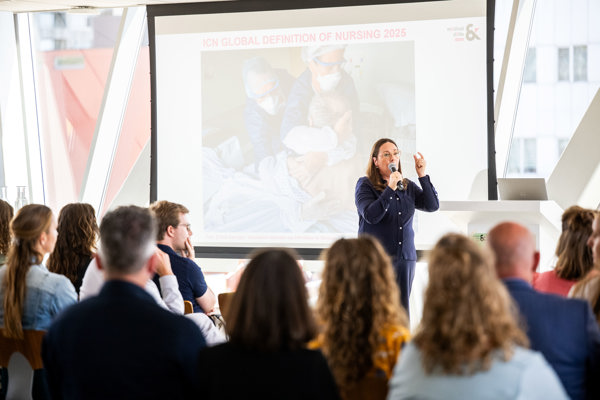
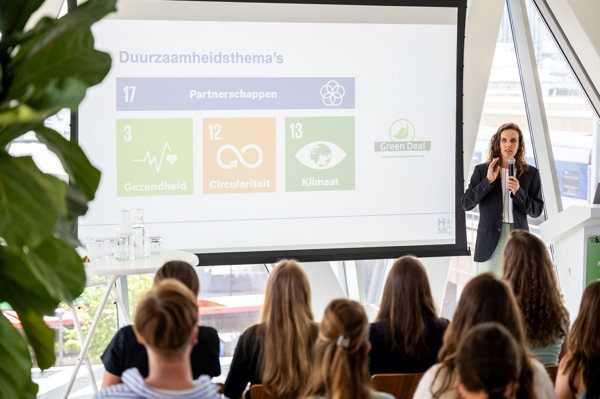
From awareness to action
Awareness of the climate impact of healthcare is growing, but real behavioral change is still lacking, says Pam van Wanrooij, program manager Sustainability at Haaglanden Medical Center. “The healthcare sector emits more than aviation. Although more and more people are aware of this, this does not automatically lead to action. The big question remains: how do we convert awareness into behavioral change?”
Haaglanden Medical Center drew up a sustainability agenda with three pillars: health, circularity and climate. “We are working on practical solutions, such as redesigning instruments and making thermal jackets reusable. By learning and improving together, we are gradually getting closer to structurally more sustainable work in healthcare. However, changes sometimes encounter resistance — often due to sentiment or lack of clarity.”
Three elements are crucial for a sustainable solution, Van Wanrooij stated: a good product, a suitable process and behavior that matches this. “If one of these is missing, the change will fail. By working on this together, we are continuously learning and we are gradually moving closer to a circular healthcare practice.”
Behavioural change for sustainable care
‘Knowing’ and ‘wanting’ do not automatically lead to ‘doing’, Dr. Laurens van Gestel, university lecturer in Behavioral Interventions in Population Health at Leiden University, told the audience. “Education is valuable, but rarely leads directly to different behavior. Motivation is also not enough. The so-called intention-behavior gap is large: people want to, but do not always act accordingly.”
“In practice, I often see that sustainable alternatives are available, but are not yet being applied. Then the question follows: ‘Can you ensure that people do?’. But behavioral change does not work with a magic wand. It starts with involving the end user from the start - so that solutions match their wishes and routines.”
According to Van Gestel, effective behavioral change requires a smart approach. “Design the environment so that sustainable choices are the easy choices. Also help motivated people to plan concrete behavior, so that they automatically act correctly in recognizable situations. With the right behavioral strategy, reducing can really be learned.”
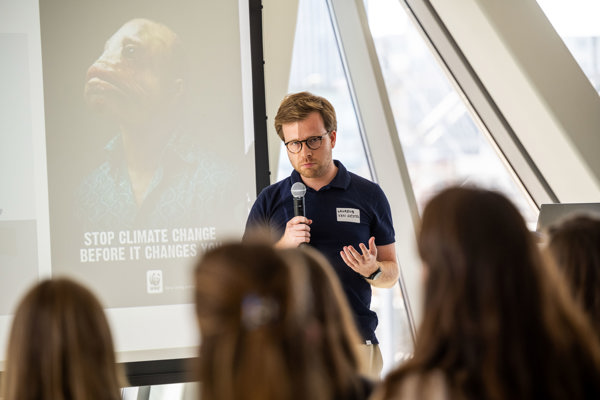
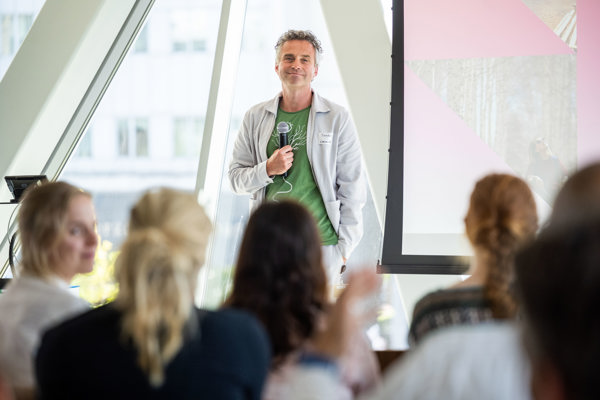
Structural anchoring in healthcare
As a reflector on the presentations, Dr. Sascha Verbruggen, pediatric intensivist and green team leader at the Sophia Children's Hospital, emphasized that sustainability must be managed from the top. “Sustainability is often a voluntary choice, while it should be just as self-evident as safe and high-quality care. Within our team, we work voluntarily on sustainable initiatives, in addition to our regular work. That makes real progress difficult. We regularly encounter resistance, short contracts or a lack of structural support from management.”
Behavioral change is crucial to make healthcare more sustainable, Verbruggen also believes. “Just like quality and safety, sustainability must be deeply anchored in the DNA of healthcare. That is why we advocate placing sustainability with quality managers. If they actively test and monitor it, something can really get moving. We need support from above – from management and policy – to make healthcare future-proof. Sustainability is no longer an option. It is a necessity.”
Responsibility from the top down
Whether the burden of change belongs to the workplace or should come from the top was also a topic of discussion during the closing discussion with the audience. Pam van Wanrooij emphasizes that many Green Teams are active, but that leadership from above is needed to really implement sustainability ambitions. “Employees must get the feeling: We are really going to do this. Processes and work environment are organized in such a way that even those less involved automatically act sustainably.”
Laurens van Gestel added that managers can direct behavior without being authoritarian, for example by offering sustainable choices as a standard option, with room to deviate from this. This way, freedom remains, but sustainable action is more easy.
Sascha Verbruggen states that freedom of choice is not always necessary. “Sustainability, like safety, should be self-evident. For example, a hospital can decide to only serve vegetarian lunches; this is not a restriction of freedom, but a necessary choice for sustainable care.”
Round Table Thesis Lab Green Care: presentations of sustainability solutions
The eleven participating students of the Thesis Lab Green Care presented the results of their interdisciplinary work to thirty professionals. In three rounds, they spoke to each other about successfully implementing greening in the workplace, copying successes and transparency in the collaboration between health insurers, manufacturers and healthcare purchasers.
The students come from eight different programmes at Leiden-Delft-Erasmus Universities and Leiden University of Applied Sciences. They presented insights on how to successfully implement greening in the workplace - such as replacing a single-use oxygen sensor with a hybrid variant in the children's ward of the Reinier de Graaf hospital, or reducing medicine waste in Surgery at the Haga hospital.
'Don't hesitate to copy successes'
The students noticed that the same sustainability issues are being worked on in many places - departments, hospitals. Their advice: 'Don't be afraid to copy successes ('proudly copied') and discuss how you can take sustainability a step further together.'
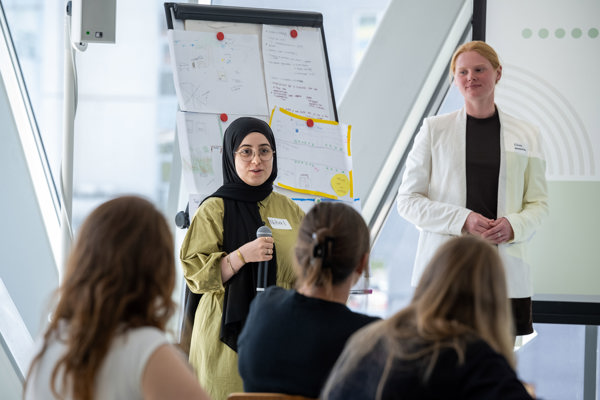
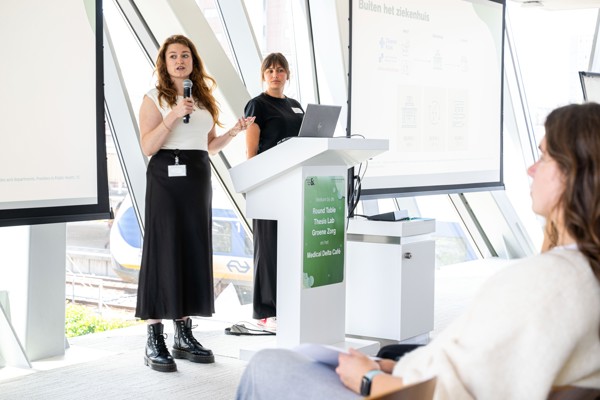
There are initiatives and methods, from regional to European, to learn from and to join – organize the exchange of these more effectively with each other. For example, by participating in the FAIR initiative to make data Findable, Accessible, Interoperable and Reusable, and thus consume less energy with AI.
'Organize a supplier day to green the purchasing procedure'
Of course, sustainability goes beyond the hospital walls and transparency in the collaboration between health insurers, manufacturers and healthcare purchasers is urgently needed. This does not always have to take the standard route. For example, one of the recommendations to the purchasing groups of hospitals is to organize a supplier day to get to know each other better and to talk to each other about sustainability and what you find important. This in turn ensures better purchasing procedures.
Submit your sustainability issue as a graduation assignment
Do you also want to collaborate with talented graduate students? Do you have a question about waste and reuse of medical devices and medicines? Participate in the Thesis Lab Green Care of next year! You can submit your question before August 17, 2025 via this link.








